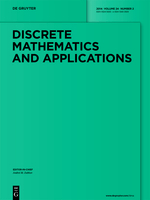
Discrete Mathematics and Applications
Scope & Guideline
Exploring Innovative Solutions Through Discrete Mathematics.
Introduction
Aims and Scopes
- Discrete Structures and Graph Theory:
The journal publishes research related to various discrete structures including graphs, trees, and networks, exploring their properties, algorithms, and applications. - Combinatorial Mathematics:
A significant focus is on combinatorial techniques, addressing problems in enumeration, designs, and configurations, often with implications for computer science and optimization. - Probability and Random Processes:
Research on probabilistic models and random processes, particularly in the context of discrete structures, is prevalent, including studies on random walks, branching processes, and equiprobable mappings. - Boolean Functions and Logic:
The journal covers the theory and application of Boolean functions, including their complexity, properties, and implementations in circuits and logical systems. - Cryptography and Information Security:
With a growing interest in security, papers often explore mathematical foundations of cryptography, including analysis of cryptographic protocols and constructions. - Algorithmic Complexity:
The journal includes studies on the complexity of algorithms, particularly in relation to Boolean functions and circuit design, contributing to the field of theoretical computer science.
Trending and Emerging
- Randomized Algorithms and Processes:
There is a noticeable increase in research related to random processes and algorithms, including studies on random walks, branching processes, and their applications in various fields. - Complexity of Boolean Functions:
An emerging focus on the complexity and implementation of Boolean functions highlights their critical role in computer science, particularly in circuit design and optimization. - Applications in Cryptography:
The intersection of discrete mathematics with cryptography is increasingly prominent, as researchers explore new cryptographic techniques and their mathematical foundations. - Probabilistic Graph Theory:
Research involving probabilistic models applied to graph theory has gained momentum, indicating a trend towards understanding complex networks through a probabilistic lens. - Interdisciplinary Approaches:
There is a growing trend towards interdisciplinary research that combines discrete mathematics with areas such as biology, economics, and machine learning, reflecting the applicability of discrete structures in diverse fields.
Declining or Waning
- Traditional Graph Theory:
While still relevant, traditional graph theory topics such as basic connectivity and classic properties appear less frequently, possibly overshadowed by more applied or computational aspects. - Elementary Combinatorial Techniques:
Basic combinatorial methods, which were once prevalent in earlier publications, are increasingly replaced by more sophisticated and integrated approaches that combine various mathematical fields. - Static Analysis of Discrete Structures:
Research focusing solely on static properties of discrete structures without considering dynamic or probabilistic aspects seems to be declining, reflecting a shift towards more applied and practical investigations.
Similar Journals

DISCRETE & COMPUTATIONAL GEOMETRY
Exploring the Intersection of Mathematics and Computer ScienceDISCRETE & COMPUTATIONAL GEOMETRY is a prestigious journal published by Springer, specializing in the fields of computational geometry, discrete mathematics, and theoretical computer science. With its ISSN 0179-5376 and E-ISSN 1432-0444, this journal has established itself as a key resource for researchers and professionals, offering a platform for the dissemination of high-quality research from 1986 to 2024. Recognized for its impact in the academic community, it currently holds a Q2 ranking in several important categories, including Computational Theory and Mathematics, Discrete Mathematics and Combinatorics, Geometry and Topology, and Theoretical Computer Science. Although it is not an open-access journal, the rigorous peer-review process ensures that published articles meet the highest standards of scientific integrity and scholarship. With Scopus rankings reflecting its influence—placing it in the 72nd percentile for Geometry and Topology and 62nd for Discrete Mathematics—it serves as an essential reference for students and scholars seeking to deepen their understanding of complex geometric and combinatorial theories.
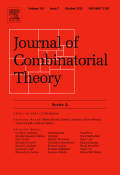
JOURNAL OF COMBINATORIAL THEORY SERIES A
Elevating Discrete Mathematics to New Heights.JOURNAL OF COMBINATORIAL THEORY SERIES A, published by Academic Press Inc. Elsevier Science, stands as a pivotal platform for researchers in the realm of combinatorial mathematics and theoretical computer science. With an impact factor that underscores its influence and a well-respected reputation reflected in its rapid ascent to Q1 rankings in discrete mathematics and computational theory, this journal serves as a critical resource for academics seeking to advance their understanding of complex combinatorial structures and algorithms.
Founded in 1971, the journal covers a wide spectrum of topics within combinatorial theory, providing a robust forum for innovative research and theoretical advancements until 2025. Including a strong position in the Scopus rankings—notably, it ranks #10 out of 92 in discrete mathematics—the journal is essential for both emerging scholars and established professionals committed to pushing the boundaries of mathematical and computational inquiry. Researchers are encouraged to submit their findings to this esteemed publication, as it offers a non-open-access model that ensures rigorous peer review and high visibility within the academic community.
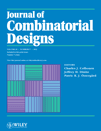
JOURNAL OF COMBINATORIAL DESIGNS
Exploring Innovative Designs in Discrete MathematicsJOURNAL OF COMBINATORIAL DESIGNS, published by Wiley, is a leading peer-reviewed journal that serves as a vital platform for researchers in the field of discrete mathematics and combinatorics. With an impressive Q1 ranking in the 2023 category, it stands at the forefront of academic discourse, showcasing significant developments and innovative research from 1993 to 2024. The journal is dedicated to the study of combinatorial designs, including their applications in various scientific disciplines, which enhances its relevance among mathematicians and applied scientists alike. Although it operates on a traditional subscription model, the journal continues to attract high-quality submissions, as evidenced by its Scopus rank of #40 out of 92 in Discrete Mathematics and Combinatorics, placing it in the 57th percentile. Its commitment to advancing knowledge in combinatorial theory and applications makes it an essential resource for professionals, researchers, and students seeking to deepen their understanding and contribute to this dynamic field.

COMBINATORICA
Advancing the Frontiers of Discrete MathematicsCOMBINATORICA, published by Springer Heidelberg, is a leading international journal dedicated to advancing the fields of Discrete Mathematics and Combinatorics. With an illustrious history dating back to 1981 and a remarkable commitment to excellence, this journal has earned its place in the highest echelons of academic publishing, currently ranked in the Q1 category for both Computational Mathematics and Discrete Mathematics and Combinatorics. Located in Germany and recognized for its high-quality research contributions, COMBINATORICA fosters innovative discussions and disseminates significant findings that shape contemporary mathematical theory. Although it does not offer Open Access options, its rigorous peer-review process ensures that each publication meets the highest scholarly standards, making it an essential resource for researchers, professionals, and students engaged in mathematical sciences. With an impactful H-Index reflecting its citation influence, COMBINATORICA continues to be a pivotal platform for groundbreaking research in combinatorics and its applications.

Applicable Analysis and Discrete Mathematics
Advancing the Frontiers of Mathematical InsightApplicable Analysis and Discrete Mathematics is a prestigious academic journal dedicated to the fields of analysis, applied mathematics, and discrete mathematics. Published by the esteemed University of Belgrade, Faculty of Electrical Engineering, this journal has established itself as a vital resource for researchers, professionals, and students alike, with a strong focus on advancing theoretical and practical knowledge in these disciplines. As of 2023, it holds a commendable ranking in the Q2 quartile across multiple categories including Analysis, Applied Mathematics, and Discrete Mathematics and Combinatorics, reflecting its significant impact and relevance in the academic community, with Scopus rankings placing it in the top 25% for Discrete Mathematics and Combinatorics. Although currently not an open-access journal, it strives to provide a platform for high-quality original research articles and discussions that bridge theoretical insights and real-world applications. Since its inception in 2007 and set to continue through 2024, the journal remains committed to fostering innovation and collaboration within the mathematical sciences.
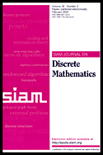
SIAM JOURNAL ON DISCRETE MATHEMATICS
Advancing the frontiers of discrete mathematics.SIAM Journal on Discrete Mathematics is a premier academic journal dedicated to the publication of high-quality research in the field of discrete mathematics. Published by SIAM Publications, this journal features original research articles covering a broad range of topics, including combinatorial optimization, graph theory, and algorithm design. With an impressive impact factor placing it in the top quartile (Q1) of mathematics journals, it is a valuable resource for researchers and practitioners looking to stay abreast of the latest advancements in discrete mathematics. Although currently not open access, the journal commits to disseminating rigorous and impactful findings that advance the understanding of mathematical concepts and their applications in various scientific domains. Renowned for its rigorous peer-review process, the SIAM Journal on Discrete Mathematics serves as an essential platform for scholars aiming to contribute to this evolving field, making it a must-read for anyone involved in mathematical research.
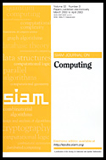
SIAM JOURNAL ON COMPUTING
Pioneering Research at the Intersection of Mathematics and Computing.Welcome to the SIAM Journal on Computing, a premier publication of SIAM Publications dedicated to advancing the field of computational science. Established in 1984, this journal provides a platform for groundbreaking research and theoretical advancements that shape the landscape of both Computer Science and Mathematics. With an impressive impact factor and consistently ranking in Q1 quartiles for its categories, the journal remains an essential resource for scholars looking to contribute to innovative computational theories and methodologies. Although not currently an open-access journal, the SIAM Journal on Computing offers rigorous peer-reviewed articles, ensuring high-quality contributions that appeal to researchers, professionals, and students alike. As we converge towards 2024, this journal continues to play a vital role in influencing future research directions and fostering an academic community devoted to the exploration of computational challenges. Join us in exploring the forefront of computing research!

Contributions to Discrete Mathematics
Pioneering insights in combinatorial research.Contributions to Discrete Mathematics, published by the Department of Mathematics and Statistics at the University of Calgary, serves as a vital platform for disseminating innovative research within the dynamic field of discrete mathematics and combinatorics. Established in 2008, this journal has rapidly gained recognition, currently holding a Q3 classification in discrete mathematics and combinatorics for 2023. As it aims to foster academic dialogue and share groundbreaking discoveries, the journal showcases high-quality peer-reviewed articles that cover a range of topics, from theoretical explorations to practical applications. Although it currently operates under a traditional subscription model, there is a growing commitment to enhancing access options, ensuring that critical knowledge is available to researchers and practitioners alike. With its notable Scopus ranking of #50 out of 92 within its category, this journal is positioned as an important resource for students, academics, and industry professionals who seek to stay at the forefront of discrete mathematics research.

Australasian Journal of Combinatorics
Pioneering Research in the World of CombinatoricsThe Australasian Journal of Combinatorics, published by the CENTRE DISCRETE MATHEMATICS & COMPUTING, serves as a vital platform for researchers and professionals engaged in the dynamic field of discrete mathematics and combinatorics. With an ISSN of 2202-3518 and an E-ISSN of the same, this journal has been committed to open access since 2014, ensuring that groundbreaking research is readily available to a global audience. Based in Australia, specifically at the Department of Mathematics, University of Queensland, this journal spans the years from 1996 to 2024, showcasing the evolution of combinatorial research over nearly three decades. Recognized in the 2023 category quartiles as Q3 in Discrete Mathematics and Combinatorics, it ranks 68th out of 92 in Scopus, reflecting its growing influence despite its current percentile of 26th. The Australasian Journal of Combinatorics is dedicated to fostering innovative research and theoretical development, making it a valuable resource for academics and students alike.
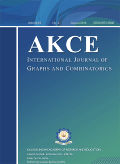
AKCE International Journal of Graphs and Combinatorics
Exploring the Frontiers of Discrete Mathematics.AKCE International Journal of Graphs and Combinatorics, published by TAYLOR & FRANCIS LTD, serves as a significant platform in the field of Discrete Mathematics and Combinatorics. With its commitment to open access since 2015, the journal ensures that cutting-edge research is readily available to a global audience, promoting the dissemination of knowledge and high-quality scholarship. Recognized for its impact in the discipline, the journal is currently ranked Q3 in its category for 2023 and holds a commendable Scopus ranking, falling within the 69th percentile. Researchers, professionals, and students alike will find invaluable insights and contributions in this journal, which spans a wide range of topics related to graph theory and combinatorial structures. Operating from its base in India, and converging from 2011 to 2024, the AKCE International Journal invites submissions that push the boundaries of mathematical exploration and foster innovative methodologies in a rapidly evolving field.